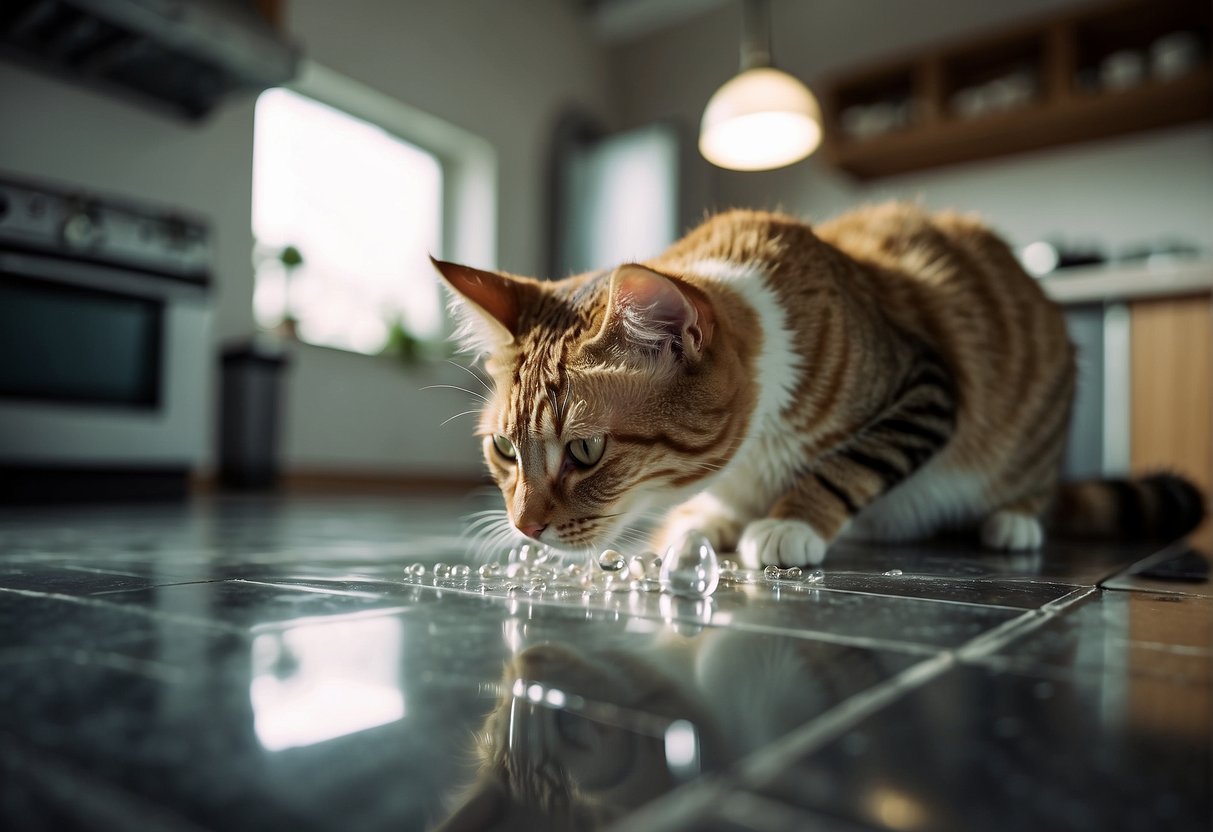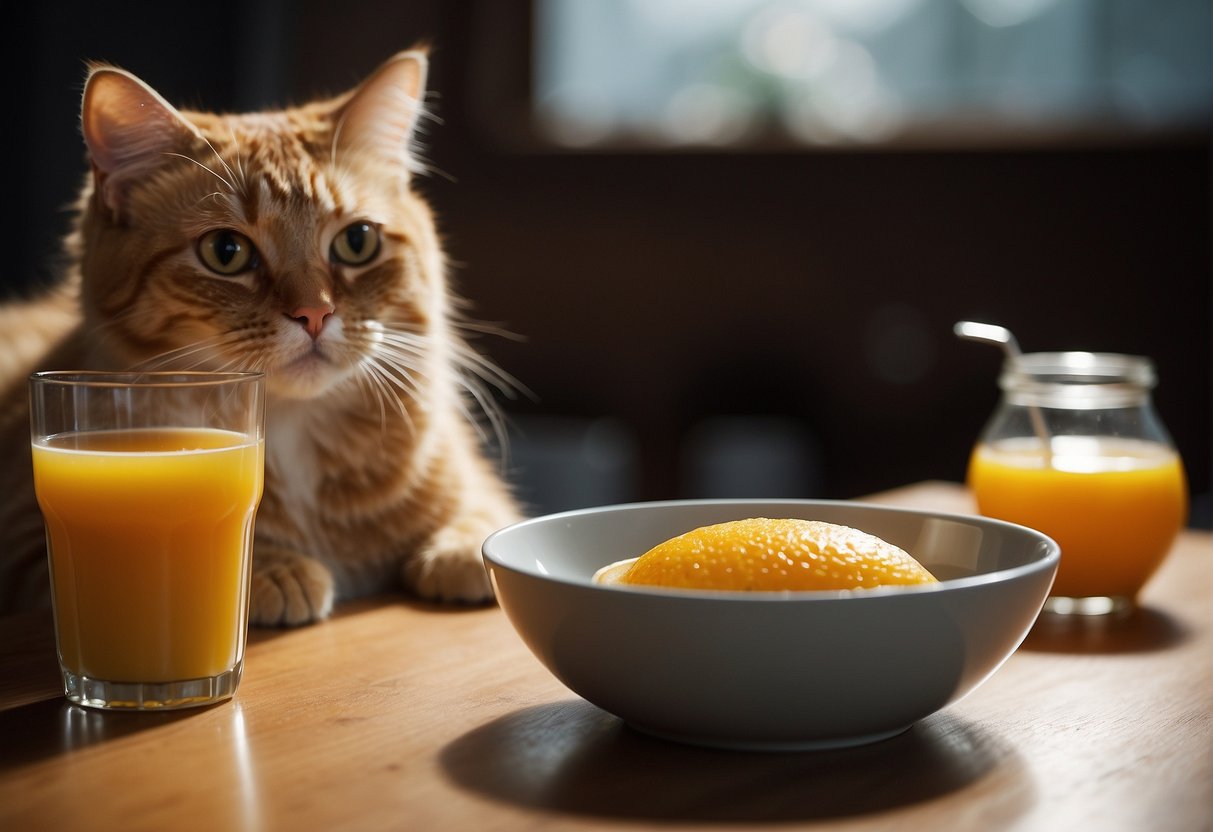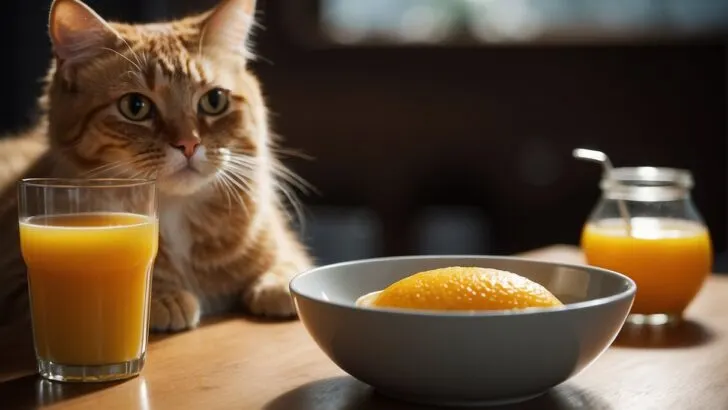Cats are naturally drawn to anything we consume, and that includes our drinks, leading many cat owners to wonder whether juice is a suitable alternative to water for their feline friends.
The quick answer is that while cats can physically ingest juice, it is not recommended for their diet.
In my experience, cats are curious creatures that might take a quick lick of a juice if they come across it, but even harmless flavors can be high in sugar and lack nutritional value for your obligate carnivore pet. Plus, certain juices might contain ingredients that are harmful to cats.

Cats require a diet primarily composed of meat. Hydration is an essential aspect of their health, but their dietary needs are quite specific compared to ours.
Water fulfills their hydration needs effectively, and unlike us, cats don’t need variety in the form of juices or other drinks.
I’ve noticed with my own pets that ensuring they always have access to fresh, clean water encourages them to stay hydrated, and there is rarely a need to introduce other liquids to their diet.
Always keeping your cat’s diet as natural and appropriate to their species is crucial.
Despite their occasional interest in our food and drinks, we have to remember that what’s good for humans isn’t necessarily good for cats.
Their digestive systems are not designed to process the sugars and additives found in juices.
If you’re looking to treat your cat or encourage hydration, there are better, vet-approved options such as giving them a small amount of specially formulated cat milk occasionally, which is more in tune with their nutritional requirements.
Cat Nutrition And Hydration

When considering what to feed your feline friend, it’s crucial to understand their specific dietary needs and how certain foods affect their health.
Cats as Obligate Carnivores
Your cat is an obligate carnivore, which means they require animal protein to thrive. In the wild, their diet would consist almost exclusively of meat.
This dietary preference is due to specific biological requirements for certain amino acids and nutrients found in animal tissue.
Feeding your cat a meat-based diet ensures they get the necessary elements like taurine, needed for heart health and vision.
The Importance of Water in Feline Diets
Water is the cornerstone of a healthy diet for cats, just as it is for humans.
Unlike the need for solid food, your cat’s need for water can’t be overstated. Always provide fresh, clean water to prevent dehydration, which can lead to health problems.
Remember, milk is not a suitable replacement for water; many cats are lactose intolerant and could experience stomach upset.
Common Dietary Considerations for Cats
When tailoring your cat’s diet, consider the following:
- Lactose intolerance: Just as some humans can’t process lactose, the same goes for cats. While they might lap up milk with gusto, it can cause digestive issues.
- Obesity: Felines can easily gain weight if their diet isn’t carefully managed. Obesity in cats can lead to serious health issues.
- Health problems: Certain foods can contribute to health issues. For instance, high-sugar content in fruit juices isn’t good for your cat, potentially leading to diabetes or obesity.
The Reality of Cats and Juice
When it comes to quenching your cat’s thirst, the array of choices can seem endless. However, it’s crucial to understand the implications of offering juice to your feline friend.
This section sheds light on the potential health risks, evaluates juice ingredients in relation to cat health, and discusses safer hydration alternatives to juice.
Potential Health Risks of Juice for Cats
Fruit juices, such as apple juice or orange juice, may seem like a fun treat for your cat, but they come with health risks.
Most juices have a high sugar content, which can lead to obesity and diabetes. Some juices might also have an acidic nature that could upset your cat’s digestive system.
It’s not just about the sugar — many fruits contain citric acid which isn’t cat-friendly.
Assessing Juice Ingredients and Cat Health
The ingredients of various juices should be assessed carefully before considering offering any to your cat.
Fruits, for example, can have natural sugars which are excessive for a cat’s diet. On top of that, artificial sweeteners, common in some juices, can be toxic to cats.
Always read labels carefully and understand that even juices that seem safe, like apple juice, should be given with caution if at all.
Safe Hydration Alternatives to Juice
Your cat’s hydration is non-negotiable, but their water bowl doesn’t need to be filled with juice for them to enjoy a drink.
The safest bet is always fresh water. If you’re looking for something to spark their interest, consider broth; specifically, bone broth can be a tasty and hydrating treat.
Clinical Perspectives on Cats and Liquids
Ensuring your feline friend receives proper hydration is crucial for its health. Vet-recommended liquids and knowing when to seek professional advice are key.
Expert Advice on Feline Hydration
Vets emphasize that water is the cornerstone of feline hydration. It supports essential bodily functions, including liver health and digestion.
While cats do get moisture from wet food, fresh drinking water should always be available.
Vets caution against offering cats human beverages like juice, milk, or tea, as cats have a limited ability to metabolize sugars and lactose.
More so, nondairy milk alternatives aren’t recommended due to added ingredients that could lead to upset stomachs or worse.
A concerning sign of improper hydration is dehydration, which can manifest as lethargy or dry gums.
You can also lift the skin on the back of your cat’s neck; if it doesn’t quickly return to normal, your cat may be dehydrated.
Providing clean water bowls in various places can encourage them to drink regularly.
When to Consult a Veterinarian
Watch for symptoms like vomiting or diarrhea—these can both cause and be signs of dehydration.
A vet should evaluate any persistent digestive disturbances to prevent complications.
If you’re contemplating adding anything besides water to your cat’s diet for hydration purposes, discuss it with your vet first. They might advise special formulations for felines that reject plain water.
Myths and Misconceptions About Cat Drinks
In the world of feline companions, what they drink is as crucial as their food. Many cat owners are tempted to share their beverages, unaware of potential health risks. Let’s clear the air on what’s myth and what’s truth about your cat’s drink options.
Debunking Common Misbeliefs
Myth: Cats can drink milk without any issues.
Truth: Most adult cats are lactose intolerant because they produce less lactase, the enzyme needed to digest lactose in milk. Giving your cat milk could cause digestive upset including diarrhea.
Myth: Cats enjoy sugary and flavored drinks.
Truth: Cats generally have a low taste receptor for sweetness and do not require sugars in their diet. Sugary drinks can lead to obesity and diabetes.
Unsuitable and Harmful Drinks for Cats
Alcohol, Coffee, and Tea: Never give your cat drinks containing alcohol, caffeine, or theine; these can be toxic.
Ingestion can lead to neurological issues and even death.
- Alcohol: Can cause severe liver and brain damage.
- Coffee/Tea: Caffeine can cause restlessness, rapid breathing, heart palpitations, and muscle tremors.
Energy and Sugary Drinks: High sugar content and substances like caffeine make these drinks harmful for cats.
Moreover, some sugar-free drinks contain xylitol, which can lead to seizures.
Onion and Garlic Broth: Broths may seem harmless, but those containing onion or garlic can cause anemia in cats due to the presence of thiosulphate.
Here’s a quick reference table on these items:
| Drink | Harmful Component | Potential Harm |
|---|---|---|
| Milk | Lactose | Diarrhea, digestive discomfort |
| Alcohol | Ethanol | Liver damage, neurological issues |
| Coffee/Tea | Caffeine | Heart palpitations, tremors |
| Energy Drinks | Caffeine, Sugar, Xylitol | Seizures, obesity, diabetes |
| Onion/Garlic Broth | Sulphur compounds (Thiosulphate) | Anemia, red blood cell damage |
Remember, when in doubt, water is always the best and safest drink for your cat.
If you want to give a treat, consider catnip or valerian-infused water in moderation, for a fun and safe alternative.

My name is James, and welcome to FAQCats!
Along with our team of cat owners, expert pet enthusiasts, and pet professionals, we aim to write engaging helpful, engaging content about cats. At FAQCats we strive to provide content that’s accurate and fun to read. Our team writes about everything related to cats; even the most complex of topics. Through extensive research and caring for our own fur-pals, we’re able to provide something cat owners worldwide will love. Have a look around, and leave us feedback anytime!

